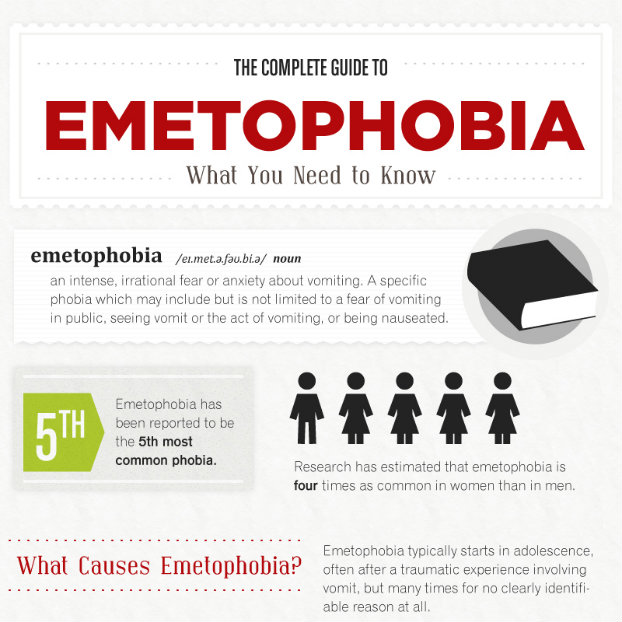Emetophobia is a little known anxiety disorder that involves the fear of vomiting or seeing someone else vomit.
 For some people, the fear is so extreme that even the word “vomit” can be nauseating or upsetting. At its most intense, emetophobia can cause people to avoid eating or limit their diet to foods they believe will not make them ill. Unfortunately, this often means missing out on vital nutrients needed to maintain good health.
For some people, the fear is so extreme that even the word “vomit” can be nauseating or upsetting. At its most intense, emetophobia can cause people to avoid eating or limit their diet to foods they believe will not make them ill. Unfortunately, this often means missing out on vital nutrients needed to maintain good health.
Origins of Emetophobia
When someone experiences intense illness — especially at a relatively young age — there can be negative mental and emotional repercussions. This has been seen in people who develop mental health conditions such as Post-Traumatic Stress Disorder (PTSD) after battling with diseases such as cancer.
A child who becomes violently ill may be emotionally impacted by the incident. The fear and pain that accompany severe illness can mentally scar a person, especially someone who is very young.
Studying Emetophobia in a Young Girl
An article by Faye et al. explores how emetophobia affected an eight-year-old girl who was diagnosed with the condition. A textbook case of an emetophobic, the child started out with a bout of illness that caused severe vomiting and nausea. After recovering from the illness, which turned out to be appendicitis, the child experienced recurring feelings of nausea. Strongly tied to her nausea was a fear of vomiting.
Despite being assured by a doctor that she was in good health, the girl’s mental state deteriorated. She began to develop irrationally strong fears related to vomit and nausea. At this point she started to show classic symptoms of emetophobia such as food avoidance, and avoidance of various places and social interaction for fear of being exposed to vomit or being sick in front of others.
A psychiatrist who diagnosed the girl (ruling out other conflicting environmental and mental health issues) prescribed her an anti-anxiety medication and an antidepressant. In conjunction with the drugs, the child learned relaxation techniques and participated in graded exposure therapy.
Graded exposure slowly teaches someone with a phobia to grow accustomed to his or her feared object (or situation). Once the person has successfully learned to feel calm in a situation which previously caused intense anxiety, he or she gradually comes closer to facing the actual phobia. At the end of graded exposure, the person no longer feels fear related to the object or situation.
This technique combined with the medications allowed the girl in the study to recover fully from emetophobia. Treatment for emetophobia — and for many other mental health conditions — tends to be more effective for people who are not yet adults.
Photo Credit: Cali2Okie (April) via Compfight cc





